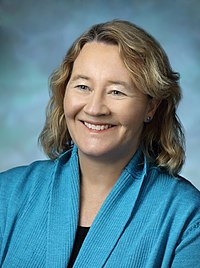Carol W. Greider
| Carolyn Widney Greider | |
|---|---|

Greider in 2014
|
|
| Born |
April 15, 1961 San Diego, California, U.S. |
| Residence |
Davis, California Santa Barbara, California Berkeley, California Baltimore, Maryland |
| Nationality | American |
| Fields | Molecular biology |
| Institutions |
Cold Spring Harbor Laboratory Johns Hopkins School of Medicine |
| Education |
University of California, Santa Barbara (B.A. 1983) University of California, Berkeley (Ph.D. 1987) |
| Thesis | Identification of a specific telomere terminal transferase activity in Tetrahymena extracts (1985) |
| Doctoral advisor | Elizabeth Blackburn |
| Other academic advisors |
Beatrice M. Sweeney David J. Asai Leslie Wilson |
| Known for | Discovery of telomerase |
| Notable awards |
Richard Lounsbery Award (2003) Lasker Award (2006) Louisa Gross Horwitz Prize (2007) Nobel Prize in Physiology or Medicine (2009) |
| Spouse | Nathaniel C. Comfort (m. 1993; div. 2011) |
| Children | 2 |
|
Website greiderlab |
|
Carolyn Widney "Carol" Greider (born April 15, 1961) is an American molecular biologist. She is a Bloomberg Distinguished Professor, Daniel Nathans Professor, and Director of Molecular Biology and Genetics at Johns Hopkins University. She discovered the enzyme telomerase in 1984, while she was a graduate student of Elizabeth Blackburn at the University of California, Berkeley. Greider pioneered research on the structure of telomeres, the ends of the chromosomes. She was awarded the 2009 Nobel Prize for Physiology or Medicine, along with Blackburn and Jack W. Szostak, for their discovery that telomeres are protected from progressive shortening by the enzyme telomerase.
Greider was born in San Diego, California. Her father, Kenneth Greider, was a physics professor. Her family moved from San Diego to Davis, California, where she spent many of her early years and graduated from Davis Senior High School in 1979. She graduated from the College of Creative Studies at the University of California, Santa Barbara, with a B.A. in biology in 1983. During this time she also studied at the University of Göttingen and made significant discoveries there.
Greider is dyslexic and states that her "compensatory skills also played a role in my success as a scientist because one has to intuit many different things that are going on at the same time and apply those to a particular problem"
...
Wikipedia
